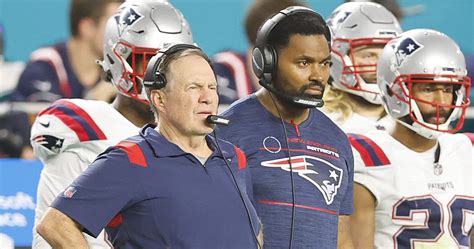
Kraft’s decision to sideline Bill Belichick in favor of a new leadership structure centered around Jerod Mayo and the subsequent hiring and swift departure of Jordon Hudson, a self-proclaimed analytics expert, has intensified scrutiny over the Patriots’ post-Belichick direction, raising concerns that owner Robert Kraft may have made a critical error in judgment.
The Patriots’ hiring of Hudson, only to see him leave the organization after a mere five weeks, has become a focal point for critics who believe Kraft undermined Belichick’s final years by installing individuals with limited NFL experience and a strong reliance on data analytics, potentially confirming what some see as Kraft’s “worst mistake.” Hudson’s brief tenure, as detailed in a recent report, has fueled the narrative that Kraft’s desire to modernize the Patriots’ approach clashed with Belichick’s traditional football philosophy, ultimately contributing to the team’s decline and Belichick’s departure.
According to veteran NFL columnist Michael Holley, “It was very clear in 2023 that Kraft had stopped listening to Belichick, and there was an alternative structure being built around him.” This alternative structure, reportedly championed by Kraft, emphasized analytics and data-driven decision-making, a shift that reportedly alienated Belichick and led to internal friction. The Hudson saga is viewed by many as a symptom of this larger power struggle and philosophical divide.
The details surrounding Hudson’s background and qualifications have also raised eyebrows. Prior to joining the Patriots, Hudson was involved in a controversial situation at his previous employer, On Location, where he allegedly made inaccurate claims about his work and attempted to leverage his position for personal gain. As reported by Chad Graff of The Athletic, “Hudson presented himself as a data expert who had worked for years in baseball analytics, but his claims were misleading and exaggerated.” The Patriots, despite this questionable background, brought him on board, further fueling the perception that they were prioritizing analytics over proven NFL experience.
The swiftness of Hudson’s departure, citing “personal reasons,” only amplified the sense of chaos and instability within the Patriots organization. His exit has intensified the debate about the Patriots’ direction and whether Kraft’s vision for the team aligns with the realities of NFL success. The situation has become a lightning rod for criticism, with many questioning the judgment of those involved in the hiring process and whether the team is adequately prepared to compete in a rapidly evolving NFL landscape.
The Patriots’ struggles in recent years have been well-documented. After decades of unparalleled success under Belichick and Tom Brady, the team has struggled to maintain its dominance. The departure of Brady in 2020 marked the end of an era, and the subsequent struggles to find a suitable replacement quarterback and rebuild the roster have been significant. The Hudson episode only adds to the sense that the Patriots are adrift, lacking a clear direction and a cohesive plan for the future.
Critics argue that Kraft’s interference in football operations, particularly his emphasis on analytics and his apparent willingness to sideline Belichick’s expertise, has been detrimental to the team. They point to the Hudson hiring as evidence that Kraft is prioritizing a flawed vision over sound football judgment.
“This is a disaster,” said one unnamed NFL analyst. “The Patriots are a laughingstock right now. They hired a guy with a questionable background and then he’s gone in five weeks? What does that say about their process? What does that say about their leadership?”
The Patriots’ decision to move on from Belichick was met with mixed reactions. While some argued that it was time for a change, others questioned whether the team could succeed without his leadership. The hiring of Jerod Mayo as head coach was seen as a gamble, given his relative inexperience. Mayo, a former Patriots linebacker and assistant coach, is highly regarded within the organization, but he faces the daunting task of filling Belichick’s shoes and restoring the team to its former glory.
The Hudson situation has only added to the pressure on Mayo. He is now tasked with not only rebuilding the team but also navigating a complex organizational structure that appears to be fractured and lacking in clear direction. Mayo’s ability to succeed in this environment will be crucial to the Patriots’ long-term success.
The Patriots have defended their new approach, arguing that they are simply adapting to the changing landscape of the NFL. They believe that analytics and data-driven decision-making are essential for success in the modern game. However, critics argue that the Patriots have become overly reliant on analytics, neglecting the importance of traditional scouting and player development.
The Hudson saga serves as a cautionary tale about the dangers of prioritizing data over experience and the importance of a cohesive leadership structure. The Patriots’ struggles in recent years highlight the challenges of rebuilding a dynasty and the need for sound judgment and clear direction. Whether Kraft’s vision for the team will ultimately succeed remains to be seen, but the Hudson episode has certainly raised serious questions about the Patriots’ future.
The details emerging about Hudson’s time at On Location paint a picture of a young man eager to advance his career, but perhaps lacking the experience and qualifications to back up his ambitions. According to sources at On Location, Hudson misrepresented his role in various projects and overstated his expertise in data analytics. He also allegedly attempted to use his position to secure personal benefits, raising concerns about his integrity and professionalism.
The fact that the Patriots were apparently unaware of these issues prior to hiring Hudson raises questions about their vetting process. Critics argue that the team failed to do its due diligence and that they were too eager to embrace Hudson’s analytics background without thoroughly investigating his credentials.
The Patriots have not publicly commented on the specific allegations against Hudson, but they have acknowledged that he left the organization for personal reasons. However, the team’s silence has only fueled speculation and intensified the criticism.
The Hudson episode has also raised questions about the influence of other individuals within the Patriots organization. Some reports suggest that Kraft’s son, Jonathan Kraft, played a key role in promoting the use of analytics within the team and that he was a strong advocate for hiring individuals with data science backgrounds.
Jonathan Kraft’s influence within the Patriots organization has grown in recent years, and he is now seen as a key advisor to his father. However, his lack of football experience has raised concerns among some observers, who question whether he is qualified to make decisions about football operations.
The Patriots’ struggles in recent years have led to a decline in fan interest and a growing sense of frustration among the team’s supporters. After decades of dominance, the Patriots are now struggling to compete in a highly competitive NFL landscape. The Hudson episode has only added to the sense of disappointment and uncertainty among Patriots fans.
The team faces a daunting task in the years ahead. They must find a franchise quarterback, rebuild their roster, and restore a sense of confidence and stability within the organization. Whether they can succeed in these endeavors remains to be seen, but the Hudson episode serves as a stark reminder of the challenges they face.
The Patriots’ situation is not unique in the NFL. Many teams have struggled to adapt to the changing landscape of the league, and many have made mistakes in their pursuit of success. However, the Patriots’ struggles are particularly notable because of their history of dominance. The team’s decline has been a shock to many, and the Hudson episode has only intensified the sense of disappointment and uncertainty.
The Patriots must learn from their mistakes and develop a clear plan for the future. They must prioritize sound football judgment, embrace a cohesive leadership structure, and restore a sense of confidence and stability within the organization. Only then can they hope to return to their former glory.
The future of the Patriots is uncertain, but the team’s fans remain hopeful that they can turn things around. The Patriots have a rich history and a passionate fan base. With the right leadership and a clear plan for the future, they can once again become a force to be reckoned with in the NFL. However, the Hudson episode serves as a stark reminder of the challenges they face and the need for sound judgment and clear direction. The team’s response to this situation will be critical in determining their long-term success. It will require a commitment to transparency, accountability, and a renewed focus on the fundamentals of football. Only then can the Patriots hope to regain the trust of their fans and return to their former glory.
The Patriots’ recent struggles have also impacted the team’s brand and reputation. After years of being one of the most respected and admired franchises in the NFL, the Patriots are now facing criticism and ridicule. The Hudson episode has only added to the damage, and the team must work hard to restore its reputation.
The Patriots can start by being more transparent about their decision-making process and by holding themselves accountable for their mistakes. They must also demonstrate a renewed commitment to ethical behavior and professional conduct. Only then can they hope to regain the respect of their peers and the admiration of their fans.
The Patriots’ situation is a reminder that success in the NFL is not guaranteed. Even the most successful franchises can fall on hard times. The key to overcoming adversity is to learn from your mistakes, adapt to the changing landscape, and remain committed to the fundamentals of success. The Patriots have the resources and the talent to turn things around, but they must first address the issues that have led to their recent struggles. The Hudson episode is a symptom of a larger problem, and the team must address the root causes of this problem if they hope to return to their former glory.
The Patriots’ response to the Hudson situation will be closely watched by the rest of the NFL. The team’s actions will send a message about its values and its commitment to success. If the Patriots handle this situation with integrity and transparency, they can begin to restore their reputation and rebuild their brand. However, if they continue to deflect blame and avoid accountability, they will only further damage their reputation and prolong their struggles.
The future of the Patriots is in their own hands. They have the opportunity to learn from their mistakes, adapt to the changing landscape, and return to their former glory. But they must first address the issues that have led to their recent struggles. The Hudson episode is a wake-up call, and the team must respond accordingly. The Patriots’ fans are waiting to see what they will do.
The overarching narrative surrounding the Patriots paints a picture of an organization grappling with an identity crisis. The team’s reliance on analytics, while not inherently negative, appears to have come at the expense of time-honored scouting practices and the wisdom of seasoned football minds. This shift in philosophy, coupled with the reported power struggles within the organization, has created a climate of uncertainty and instability.
The Patriots’ decision to entrust key personnel decisions to individuals with limited NFL experience has also drawn criticism. While embracing new ideas and perspectives is important, the team’s apparent willingness to overlook traditional qualifications in favor of data analytics has raised concerns about their judgment and their understanding of the nuances of the game.
The Patriots’ struggles serve as a cautionary tale for other NFL teams. The team’s decline highlights the importance of maintaining a balanced approach to team building, combining data analytics with traditional scouting and player development. It also underscores the need for strong leadership, clear communication, and a cohesive organizational structure.
The Patriots’ situation is a reminder that success in the NFL is not solely dependent on talent or resources. It also requires sound judgment, strategic planning, and a commitment to excellence. The Patriots have the potential to turn things around, but they must first address the issues that have led to their recent struggles. The Hudson episode is a microcosm of these larger problems, and the team’s response to this situation will be critical in determining their long-term success.
The Patriots’ legacy of success is undeniable. However, their recent struggles have tarnished that legacy. The team has an opportunity to reclaim its former glory, but it will require a concerted effort to address the issues that have plagued them in recent years. The Hudson episode is a test of their resolve, and their response will be closely watched by the rest of the NFL.
Frequently Asked Questions (FAQ)
-
Who is Jordon Hudson and what was his role with the New England Patriots?
Jordon Hudson was hired by the New England Patriots as an analytics expert. According to reports, he presented himself as having extensive experience in baseball analytics. However, his claims were later found to be misleading. He left the team after only five weeks, citing “personal reasons.” His specific role was to contribute to the team’s data-driven decision-making process.
-
What is the controversy surrounding Jordon Hudson’s hiring and departure?
The controversy stems from Hudson’s allegedly exaggerated credentials and the brevity of his tenure. Reports indicate that Hudson misrepresented his experience at his previous employer, On Location, and his rapid departure raised questions about the Patriots’ vetting process and their reliance on analytics. Critics argue his hiring and quick exit are symptomatic of a larger issue within the team: a disconnect between the coaching staff and the front office and an over-emphasis on analytics at the expense of traditional football expertise. The Patriots have not released much information regarding the situation.
-
How does the Jordon Hudson situation relate to Bill Belichick’s departure from the Patriots?
The Hudson situation is viewed by many as a consequence of a philosophical clash between Belichick’s traditional football approach and Kraft’s desire to modernize the team with analytics. Critics argue that Kraft’s emphasis on analytics undermined Belichick’s authority and ultimately contributed to his departure. Michael Holley stated that, “Kraft had stopped listening to Belichick, and there was an alternative structure being built around him.”
-
What are the potential implications of the Hudson situation for the New England Patriots?
The Hudson situation has several potential implications for the Patriots:
- Damage to Reputation: The controversy has damaged the team’s reputation, with critics questioning their judgment and decision-making processes.
- Increased Scrutiny: The team’s approach to analytics and personnel decisions will face increased scrutiny.
- Internal Discord: The situation could exacerbate existing tensions within the organization.
- Impact on Team Performance: The controversy could distract from the team’s efforts to rebuild and improve their performance on the field.
- Fan Disenchantment: It might further alienate or discourage fans, particularly given the recent struggles the team has been facing since Brady left.
-
What has been the Patriots’ response to the controversy surrounding Jordon Hudson?
The Patriots have not released an official statement regarding the specifics of the issue. They have acknowledged Hudson’s departure, citing “personal reasons,” but have not addressed the allegations of misrepresented credentials or the broader concerns about their reliance on analytics. This silence has fueled speculation and criticism.









